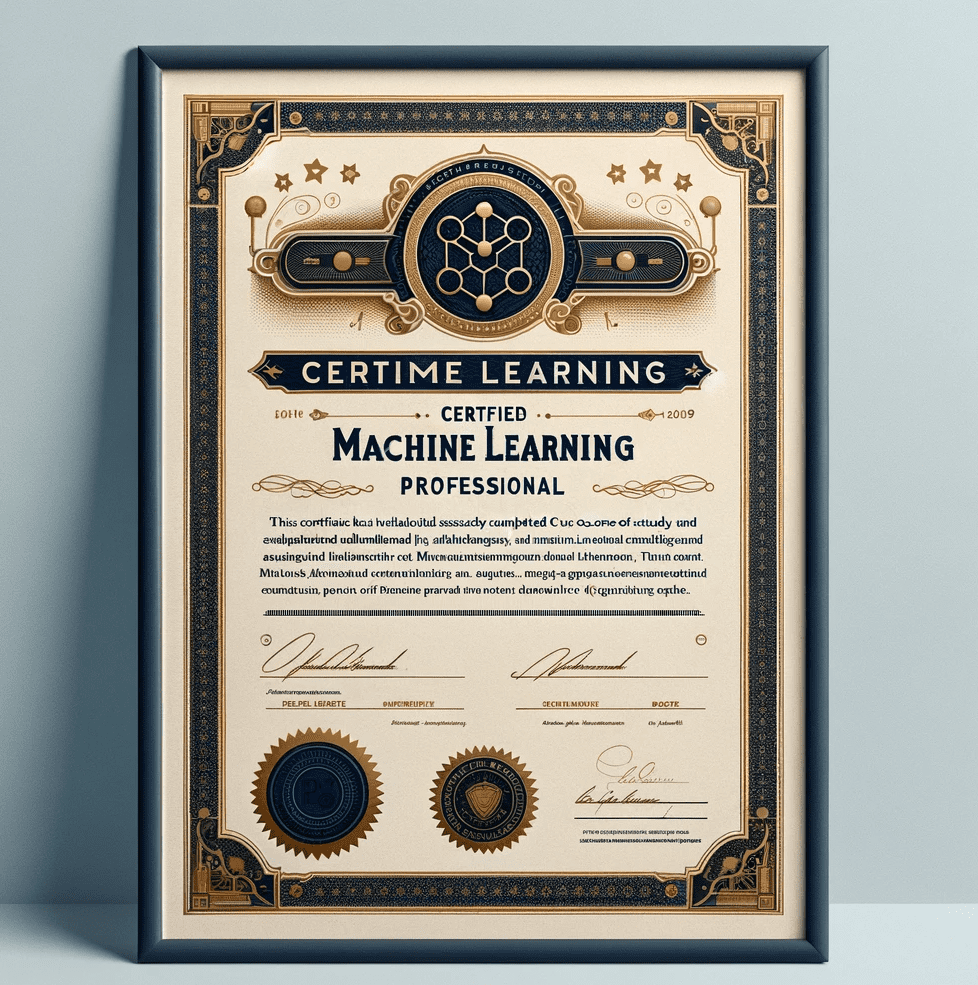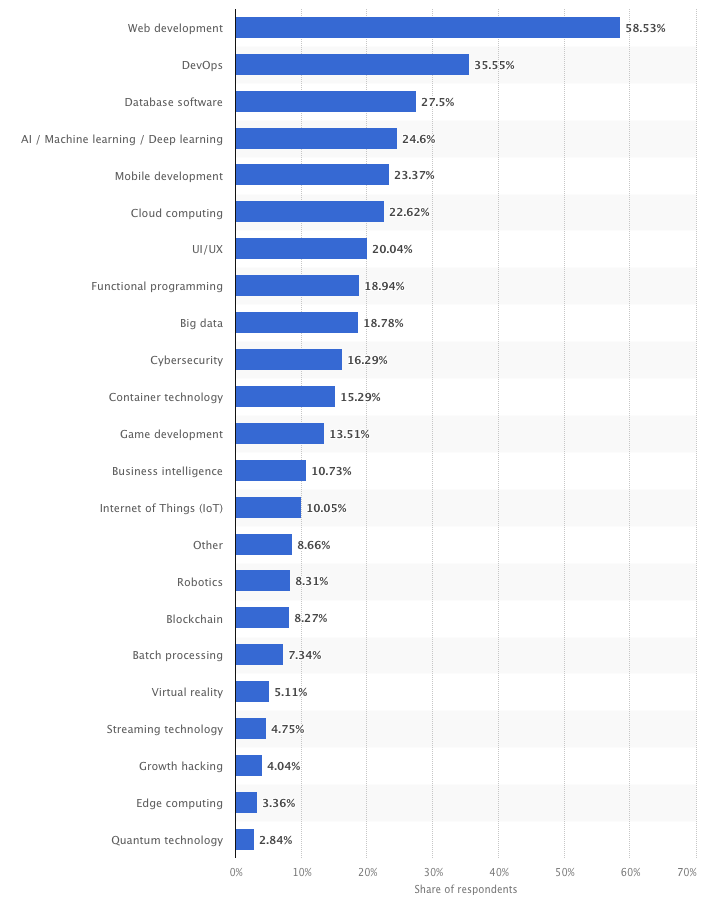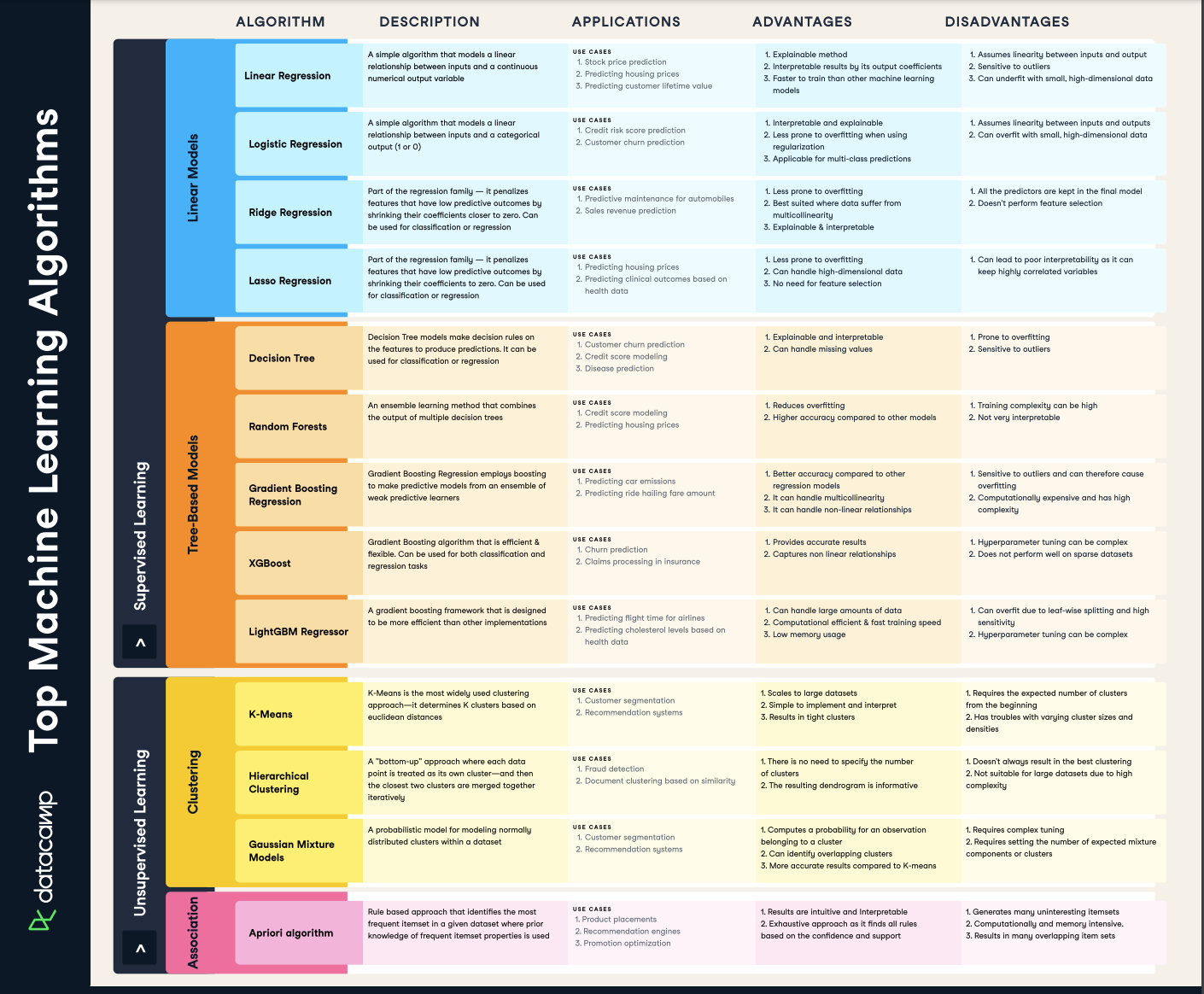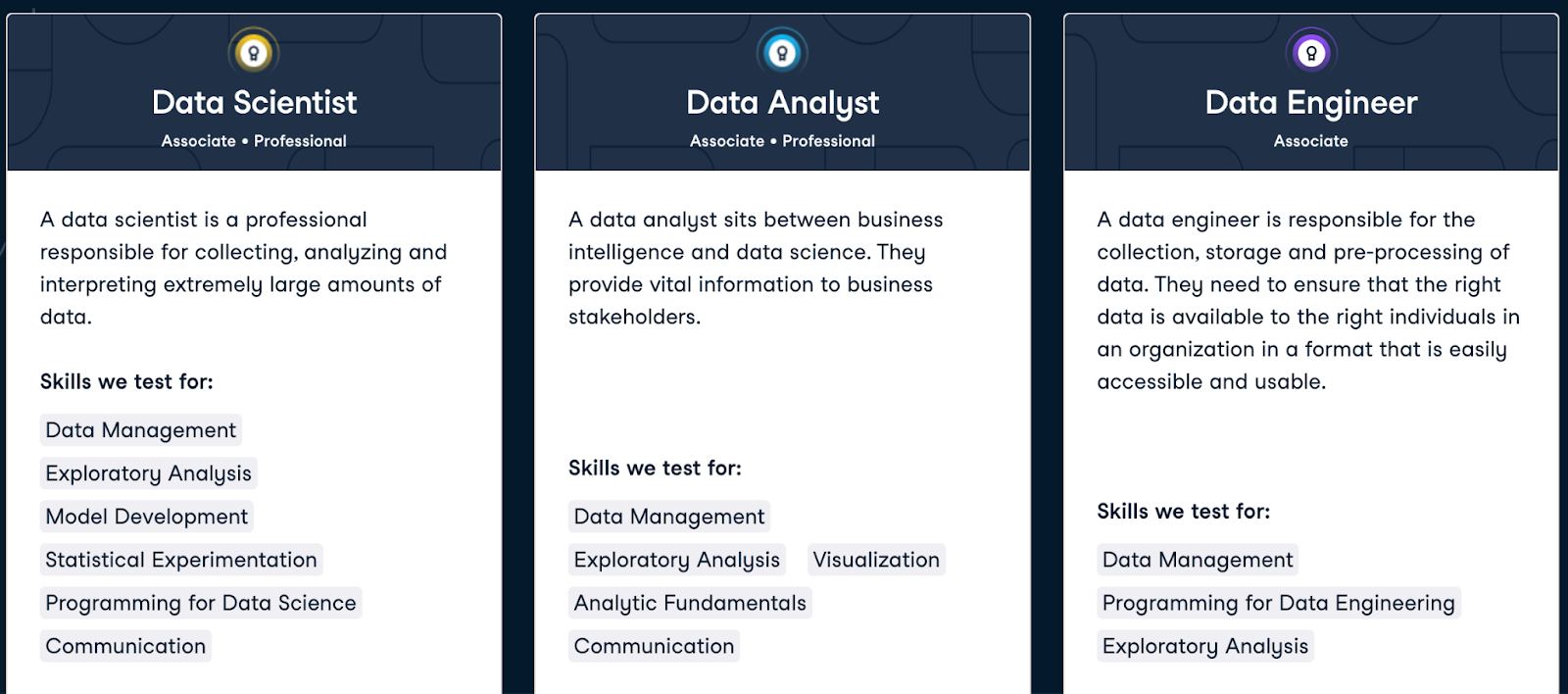track
A Guide to The Top Machine Learning Certifications For 2024
In an era where artificial intelligence and machine learning (ML) are reshaping industries, professionals are increasingly seeking ways to validate their expertise and stand out in a competitive job market. Machine learning certifications have emerged as a crucial benchmark for proficiency in this cutting-edge field. These certifications not only enhance a professional's credibility but also keep them abreast of the latest technologies and methodologies.
In this guide, we delve into the most sought-after machine learning certifications for 2024, provided by AWS, Google Cloud, Microsoft, Databricks, and eCornell. Each certification is distinct, focusing on specific aspects of ML ranging from data manipulation to real-world application. We’ll also explore some of the DataCamp resources to help you get machine learning certified.
Get certified in your dream data role
Our certification programs help you stand out and prove your skills are job-ready to potential employers.
What is Machine Learning Certification?
Machine learning certification is a formal recognition awarded to individuals who have demonstrated proficiency in machine learning (ML) concepts, techniques, and applications. These certifications are offered by educational institutions, technology companies, and professional organizations to validate a person's skills in designing, implementing, and managing machine learning projects.
Here are some of the key aspects of machine learning certification:
- Validation of Skills: Certifications serve as evidence of an individual's capability to tackle real-world ML challenges, from data preprocessing and model selection to deployment and optimization.
- Industry Recognition: Earning a certification from a reputable provider signals to employers and peers that the holder meets certain professional standards, making it a valuable asset in the job market.
- Learning Pathway: Pursuing certification typically involves engaging with a structured learning program that covers essential machine learning topics, thereby ensuring a comprehensive understanding of the field.
- Career Advancement: For professionals looking to enter or advance in the field of data science and machine learning, certifications can open doors to new opportunities, higher salaries, and more influential roles within organizations.
- Continuous Learning: The process of getting certified encourages continuous learning and adaptation to new technologies and methodologies, keeping individuals updated with the latest advancements in the ML domain.
In essence, machine learning certification is more than just a credential; it's a stepping stone towards establishing expertise in one of the most dynamic and impactful areas of technology today.

Created using DALL-E 3
Machine Learning Certification vs Machine Learning Certificate
Machine Learning Certifications and Certificates serve different purposes within the realm of professional development in machine learning. A certification is a formal endorsement by a reputable organization that you have achieved a certain level of mastery in machine learning. It's aimed at those looking to validate their comprehensive skills and knowledge, often requiring the passing of rigorous exams. This type of credential is highly valued in the industry, especially for those seeking advanced job positions.
On the other hand, a certificate is typically awarded after completing a course or series of courses, focusing on imparting specific knowledge or skills in machine learning. The assessment for a certificate usually involves course completion and projects, without the standardized exams required for certification. While certificates can bolster a resume by demonstrating a commitment to ongoing education, they generally do not carry the same weight as certifications in terms of validating expertise.
Why Pursue a Machine Learning Certification?
The World Economic Forum predicts a significant increase in demand for AI and ML specialists, expecting a growth of 40% between 2023 and 2027. Similarly, Statista suggests that AI and machine learning are some of the most in-demand tech skills. As such, machine learning certifications are more than just educational accomplishments; they are gateways to new career opportunities and pathways for professional advancement.
For professionals looking to transition into ML roles or those seeking to solidify their expertise in the field, a certification acts as a powerful tool. It signals to employers a commitment to the field, a readiness to tackle complex ML challenges, and a dedication to staying abreast of the latest developments.
Moreover, as the demand for skilled ML practitioners continues to grow, certifications can be the differentiator that sets candidates apart in a crowded job market. They offer tangible proof of skills, often aligning with industry standards and requirements, thus making certified individuals highly attractive to potential employers.

Machine learning is one of the most in-demand tech skills - source
The Top Machine Learning Certifications For 2024
Now that we know the value of a machine learning certification, let’s look at some of the top options out there. These are offered by some of the biggest names in the industry, potentially giving you the edge over the competition in the job market.
1. AWS Certified Machine Learning - Specialty
AWS's certification is tailored for those who perform a development or data science role. It validates the ability to design, implement, and maintain ML solutions for given business problems. A key focus is on leveraging AWS cloud services and understanding the best practices for ML implementation.
- Who it's for: Individuals in a development or data science role with experience in ML/deep learning workloads on AWS.
- Prerequisites:
- Two years of hands-on experience with ML or deep learning on AWS.
- Knowledge of basic ML algorithms and experience in hyperparameter optimization.
- Duration: 180 minutes for the exam.
- Cost: $300.
2. Google Cloud Certified - Machine Learning Engineer
This certification is designed for professionals who build and maintain models in Google Cloud. It emphasizes integrating ML models into applications and managing model performance. The certification is ideal for those who are familiar with Google Cloud products and solutions.
- Who it's for: Individuals who build and maintain machine learning models on Google Cloud.
- Prerequisites: None, although 3 years of industry experience is recommended, with 1 or more years of designing and managing solutions using Goolge Cloud.
- Duration: Two-hour exam, 50-60 multiple choice and multiple select questions.
- Cost: $200.
3. Microsoft Certified: Azure Data Scientist Associate
Microsoft's certification is for professionals who apply Azure's ML and AI services in their workflow. It tests skills in data science and machine learning, emphasizing the integration of Azure services. This certification is suitable for those who are looking to demonstrate their proficiency in cloud-based ML solutions.
- Who it's for: Professionals specializing in applying data science and ML on Azure, including designing environments for data science workloads, training models, and deploying scalable solutions.
- Prerequisites: Experience in Azure Machine Learning and MLflow, with a focus on practical application in data science.
- Duration: Specific duration not provided for the certification, but it includes an exam.
- Cost: $165.
4. Databricks Certified Machine Learning Professional
Databricks' certification focuses on applied ML skills, especially in big data environments. It assesses the ability to build, tune, and deploy ML models using the Databricks platform. This certification is particularly valuable for those who work with big data and are looking to implement scalable ML solutions.
- Who it's for: Individuals capable of performing advanced ML tasks using Databricks Machine Learning, including experiment tracking, model lifecycle management, deployment, and monitoring for data drift.
- Prerequisites: No specific prerequisites stated, but related training and hands-on experience with the relevant ML tasks are highly recommended.
- Duration: 120 minutes for the exam.
- Cost: $200.
5. eCornell Machine Learning Certificate
The eCornell certificate offers an academic approach to machine learning. It is designed to provide a strong theoretical foundation as well as practical skills in ML. This program is ideal for those who prefer a more structured, educational approach to learning ML.
- Who it's for: Programmers, developers, data analysts, statisticians, data scientists, software engineers.
- Prerequisites: Prior experience in math, familiarity with Python, probability theory, statistics, multivariate calculus, and linear algebra recommended.
- Duration: Approximately 3.5 months, with an estimated effort of 6-9 hours per week.
- Cost: $3,750.
Best Machine Learning Certifications Compared
Here's a table comparing the machine learning certifications mentioned above:
| Certification | Target Audience | Prerequisites | Duration | Cost |
|---|---|---|---|---|
| AWS Certified Machine Learning - Specialty | Individuals in a development or data science role with AWS ML/deep learning experience | Two years of hands-on AWS ML/deep learning experience, knowledge of basic ML algorithms | 180 minutes exam | $300 |
| Google Cloud Certified - Machine Learning Engineer | Individuals maintaining ML models on Google Cloud | 3 years of industry experience recommended, 1+ years with Google Cloud | Two-hour exam, 50-60 questions | $200 |
| Microsoft Certified: Azure Data Scientist Associate | Professionals applying data science and ML on Azure | Experience in Azure Machine Learning and MLflow | Includes an exam (duration not specified) | $165 |
| Databricks Certified Machine Learning Professional | Individuals performing advanced ML tasks using Databricks Machine Learning | Related training and hands-on experience with relevant ML tasks recommended | 120 minutes exam | $200 |
| eCornell Machine Learning Certificate | Programmers, developers, data analysts, statisticians, data scientists, software engineers | Experience in math, Python, probability theory, statistics, multivariate calculus, and linear algebra recommended | Approximately 3.5 months, 6-9 hours per week | $3,750 |
Choosing the Right Certification for You
With a variety of machine learning certifications available, selecting the one that best aligns with your career aspirations and skill level is crucial. Here are some key considerations to help you make the right choice:
Assess your current skill level and career goals
Begin by evaluating your current expertise in machine learning. Are you a beginner looking to gain foundational knowledge, or are you an experienced practitioner seeking advanced skills? Also, consider your long-term career goals. For instance, if you're interested in cloud-based ML solutions, certifications from AWS, Google Cloud, or Microsoft Azure might be more relevant.
Consider the certification's focus and curriculum
Each certification has a unique focus. For example, AWS and Azure certifications are more aligned with cloud services, whereas the eCornell certificate provides a broader, academic approach. Review the curriculum and learning outcomes of each certification to ensure they match your learning needs and the specific skills you want to acquire.
Explore the prerequisites and commitment required
Consider the prerequisites for each certification. Some may require prior experience or familiarity with specific tools and languages. Additionally, assess the time and financial commitment required for each certification. Balancing these factors with your personal and professional commitments is essential.
Consider the industry recognition and career advancement opportunities
Research how different certifications are perceived in the industry. Look for testimonials or case studies of professionals who have completed the certifications. This can provide insights into how these certifications have impacted their careers and how they might influence yours.
Getting Machine Learning Certified With DataCamp
DataCamp offers a diverse range of courses and resources that can be instrumental in your journey towards gaining machine learning certification. Here’s how DataCamp can help you prepare for and achieve machine learning certification:
1. Comprehensive course offerings
DataCamp provides a variety of machine learning courses tailored for different skill levels, from beginners to advanced practitioners. Our Machine Learning Fundamentals with Python skill track is designed to build foundational knowledge, whereas more specialized courses such as Developing Machine Learning Models for Production and Feature Engineering for Machine Learning in Python focus on practical applications and advanced concepts in machine learning.
2. Hands-on learning experience
Our platform emphasizes a hands-on, interactive approach to learning. This method is particularly beneficial for grasping complex machine learning concepts and applying them in real-world scenarios.
With courses like Practicing Machine Learning Interview Questions in Python and Introduction to Deep Learning with Keras, learners can sharpen their skills through practical exercises and projects.
3. Access to diverse learning materials
DataCamp offers a wealth of tutorials, webinars, and blog posts that complement their course offerings. These additional resources provide in-depth insights into various machine learning topics and the latest industry trends.
Resources such as What is a Confusion Matrix in Machine Learning? and A Comprehensive Introduction to Anomaly Detection are great for expanding your understanding beyond the structured course content.

Our Machine Learning cheat sheet can help you prepare for certification
4. Project-based learning
Applying your skills to real-world projects is critical for understanding the practical aspects of machine learning. DataCamp provides project-based learning opportunities where you can work on real datasets and solve actual machine learning problems.
Our list of the top machine learning projects for all levels allows you to apply what you’ve learned in a practical, hands-on manner.
5. Preparation for machine learning interviews
If you’re aiming to secure a job in machine learning, DataCamp’s courses can help you prepare for technical interviews. The platform offers resources specifically designed to help you practice common machine learning interview questions.
By leveraging DataCamp’s extensive course library, interactive learning format, and additional resources, you can gain the necessary skills and confidence to pursue various machine learning certifications and excel in your machine learning career.
Role-Specific Certification with DataCamp
DataCamp offers role-specific certifications that are tailored to the distinct needs of various data professionals. These certifications are designed to validate your skills and enhance your credibility in your chosen field. What’s more DataCamp certifications are free for Premium users.
1. Data Analyst Certification
- Target audience: Ideal for professionals who want to excel in data analysis using tools like Python, R, SQL, and Tableau.
- Key learning areas: The certification covers data manipulation, data visualization, and statistical analysis, equipping learners with the skills to derive actionable insights from data.
- Structure and content: The program includes a blend of courses, hands-on exercises, and projects, ensuring a comprehensive understanding of data analysis concepts.
2. Data Scientist Certification
- Target audience: Suitable for individuals aiming to become data scientists, focusing on skills like statistical analysis, machine learning, and data manipulation.
- Key learning areas: This certification covers a wide range of topics from exploratory data analysis to machine learning, deep learning, and even advanced subjects like NLP.
- Structure and content: It provides an in-depth understanding of data science methodologies and tools, including practical applications and project work.
3. Data Engineer Certification
- Target audience: Designed for professionals interested in data engineering, focusing on building scalable data infrastructure and pipelines.
- Key learning areas: The certification encompasses big data processing, data engineering tools (like Spark), and working with databases.
- Structure and content: It combines theoretical knowledge with practical skills, enabling learners to build efficient data storage and retrieval systems.

DataCamp’s Certifications
What Jobs Can You Get with Machine Learning Certification?
Machine learning certification opens the door to a wide range of career opportunities in the tech industry, as it validates your expertise in one of the most sought-after fields. Here are some of the key roles that candidates with machine learning certification can pursue:
1. Machine Learning Engineer
- Role: Design and implement machine learning models to solve business problems, optimizing algorithms for performance and scalability.
- Skills: Proficiency in programming languages like Python or R, knowledge of ML frameworks (e.g., TensorFlow, PyTorch), and experience with cloud computing platforms.
Check out our full guide on how to become a machine learning engineer to find out more.
2. Data Scientist
- Role: Analyze and interpret complex data to help organizations make informed decisions. Use machine learning techniques to predict future trends and patterns.
- Skills: Strong analytical skills, experience with statistical tools and software, and the ability to communicate findings effectively.
Find out more about how to become a data scientist in our eight-step guide.
3. NLP (Natural Language Processing) Engineer
- Role: Work on systems that enable computers to understand, interpret, and generate human language. Applications include chatbots, translation services, and sentiment analysis.
- Skills: Knowledge of linguistics, experience with NLP libraries and frameworks, and programming skills.
Our Natural Language Processing With Python skill track can help you master the fundamentals you'll need to pursue this career.
4. Data Analyst
- Role: Extract and analyze data to identify trends, patterns, and insights. Often involves the use of machine learning techniques to enhance data analysis.
- Skills: Strong statistical background, proficiency in data visualization tools, and experience with SQL and programming languages.
Read more about how to become a data analyst and what the role entails in our separate guide.
5. Business Intelligence Developer
- Role: Develop, deploy, and maintain BI interfaces, such as query tools, data visualization dashboards, and data modeling tools, incorporating machine learning models for predictive analytics.
- Skills: Experience with BI tools, knowledge of database management, and understanding of machine learning applications in business.
Our guide on how to become a Power BI developer can help you move into this field.
Final Thoughts
Pursuing a machine learning certification is a strategic move in today's tech-centric world. It enhances your professional profile and deepens your understanding of critical ML concepts. DataCamp, with its comprehensive courses and role-specific certifications, offers a tailored pathway to mastering machine learning, whether you're a beginner or an experienced practitioner.
Consider the Machine Learning Fundamentals Track on DataCamp as a starting point or a refresher. This track provides a solid foundation in essential ML techniques and concepts, equipping you with the knowledge to excel in this field.
Embrace this opportunity to advance your skills and career. Begin your journey in machine learning with DataCamp's Machine Learning Fundamentals Track and set yourself up for success in the ever-evolving world of data science.
Get certified in your dream data role
Our certification programs help you stand out and prove your skills are job-ready to potential employers.

A writer and content editor in the edtech space. Committed to exploring data trends and enthusiastic about learning data science.
Machine Learning Certification FAQs
Who should consider getting a machine learning certification?
Anyone looking to validate their skills in machine learning, advance their career in data science or AI, or transition into a role requiring ML expertise. This includes data scientists, software engineers, and professionals in related fields.
Do I need to have a background in programming to pursue machine learning certification?
Yes, a fundamental understanding of programming, typically in Python or R, is essential for most machine learning certifications. Some programs may require more advanced programming skills.
Are there any prerequisites for machine learning certifications?
Prerequisites vary. Some certifications require years of relevant experience or knowledge of specific technologies and platforms. It's important to review the prerequisites of each certification to ensure you meet them before applying.
Can machine learning certification help me get a job?
Yes, certifications can significantly enhance your resume by demonstrating your expertise and commitment to the field. They are often valued by employers when hiring for roles that require machine learning skills.
Is machine learning certification worth it?
For many professionals, the answer is yes. Certifications can open up new career opportunities, lead to higher salaries, and help you stay competitive in a fast-evolving field.
Are there any other types of certifications that will benefit my career?
If you're looking to prove your expertise in machine learning, a Tensorflow certification, AI certification, prompt engineering certification or Python certification may also be of interest to you.
Improve Your Machine Learning Skills!
course
Feature Engineering for Machine Learning in Python
course
Machine Learning with PySpark
blog
The Top AI Certifications for 2024: A Guide to Advancing Your Tech Career
blog
The Top Machine Learning Jobs in 2022 and How to Get Them
blog
How to Learn Machine Learning in 2024
blog
Top 4 Apache Spark Certifications in 2024
Srujana Maddula
9 min
blog
The 12 Best Azure Certifications For 2024: Empower Your Data Science Career
blog
Top 10 Machine Learning Conferences for 2024
Kevin Babitz
7 min